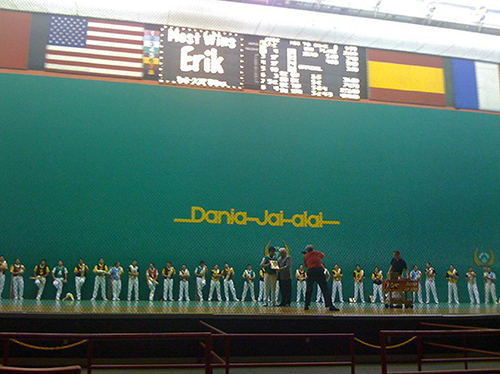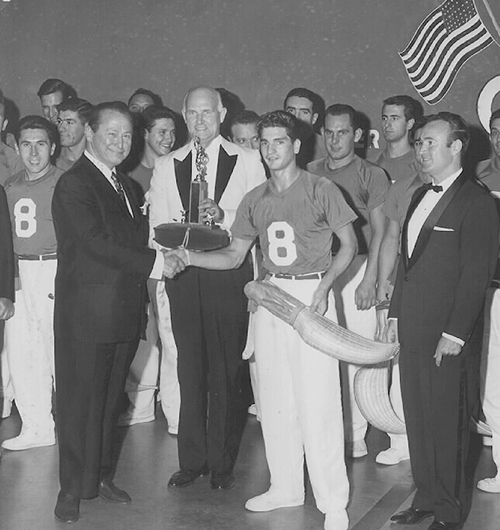At a time of economic crisis like the present there are Basque companies who have found a hopeful output in the international market. Indeed, some of the few companies managing to maintain employment are companies like Mondragón Corporation, Irizar and CAF for example. These companies, created in the Basque Country, are adapting to globalization through implementation in other countries.
Is there an example of pioneer companies in the internationalization process in the Basque Country?
Interestingly, a genuinely Basque sport, “cesta-punta” or jai-alai, as it is known in many countries, has been and remains, in some way, an international vocation beyond its domestic origin.
“Cesta-punta” is a modality of several that make up Basque ball games. It is a type of game that has managed to innovate and adapt to changing times. At the beginning of the 20th century “cesta-punta” managed to reinvent itself in a place far away from the Basque Country, specifically in Argentina.

The Dania Jai Alai court | Photo: EL DIARIO VASCO
First of all, the origin of “cesta-punta” comes from an ancient form of game which consisted of clashes in the open field initially, and later, in town squares which served as courts or playing fields. Face-to-face games as in tennis, in which the players used the naked hand, gloves or xisteras (baskets made of wicker).
Before we know it, we are in the 19th century and the game is modified. Players launch the ball toward a front wall, and the way the game is played changes dramatically. They play facing the front and not from the front. What was called “blé” emerged, a game where the players used baskets made of chestnut and wicker. There is a shift from the rural setting to urban.
The process of industrialization brings sociological changes and the entrepreneur emerges. At the end of the 19th century covered pelota courts with stands for seating are built in cities such as Bilbao and San Sebastian. Betting through the so-called brokers or intermediaries between the bettors will become the main source of income of the new industry.
San Sebastian, a vacation destination for the political class and the Spanish royalty is the perfect place for this “blé” or “tip – ball” game to become popularized, and would later become the modern “cesta-punta”. Moreover, it is in this city on the occasion of the construction of a new pelota court in which the first Fronton called “Jai Alai” (“Happy Festival”) emerges. Serafín Baroja – a mining engineer and Basque writer and father of the novelist Pio Baroja – coined the term “jai-alai”, a name which, with the passing of time, became known internationally as “cesta-punta”.
Popularity with the public and the profitability achieved through betting contributes to its expansion, first to Madrid, the capital of the Kingdom, where several pelota courts are opened at the end of the 19th and early 20th century. At this time the Basque pelota industry expands to South America where the players are contracted to play in Argentina and Uruguay as well as the handball courts of Madrid and Barcelona.
It is in Argentina where the “tip – bolea” evolves and becomes “cesta-punta” or jai-alai as you know it. A pelota player of Gipuzkoa, from the town of Renteria called Guruzeaga suffers a serious injury to his right arm which prevents him from playing. He comes up with the idea of using a basket a bit longer and deeper allowing the use of a back-hand position. The basket which in those days was called the “mauser” was born, in reference to the firearm. The game undergoes radical change, the ball goes faster, further and allowing another type of play. The game gains in showmanship.

Successful times for Jai Alai in the USA | Photo: EL DIARIO VASCO
“Cesta-punta” expands to four continents. In some locations playing up to 40 points lends itself to pool-betting and facilitates the popularization of betting. The expansion spans African countries such as Egypt where pelota courts are opened in Alexandria and Cairo; Tangier (Morocco); Cuba, Mexico, and other countries in South America. In the 1930’s a pelota court opens in Shanghai, two years later in Tien Sin, up to the beginning of the revolution of Mao. Elsewhere, in Asia, in the Philippines jai-alai will find yet another place for expansion.
International expansion seems to know no limits. In the United States, in Miami (Florida) a fronton was inaugurated in the 1920’s. Little by little jai-alai gains strength and expands to different Floridian cities like West Palm Beach, Tampa, Orlando, Daytona, Dania. Four month seasons, in the form of pool betting, are played in all of them. The players alternate their performances in other locations, either on American soil or in Spanish cities.
A superficial analysis of the “cesta-punta” industry tells us that it has suffered variations with markets disappearing and others sprouting up to replace them. Frontons are closed due to real estate reasons, given that many of the handball courts were constructed in choice locations of cities. In many occasions it was a political consequence, such as the revolutions in China and Cuba. Legislative changes in Brazil or Indonesia, where betting was prohibited, condemned frontons to their death. The resurgence of other types of betting with lotteries, casinos etc., taking place in Florida (USA), has contributed to the loss of appeal of the fronton as a betting place.
The expansion-innovation-expansion of the “cesta-punta” industry has historically been a constant. For the last two decades “jai-alai” has suffered a brutal setback. For example, in 1988 there were fourteen frontons in the United States alone, distributed in Florida, Connecticut and Rhode Island.
But currently there is one fronton open in the Philippines, in the Cagayan Valley. Two in the United States, Miami and Dania. They remain open because of the current legislation in the State of Florida requiring a minimum of 150 annual shows to retain permission to bet. The current owners of these two frontons used this permission for “jai-alai” to offer another type of betting in the same enclosure, slot machine, poker etc. The conversion of the handball courts into a kind of casino, where jai-alai and casino games share space has managed to keep the game of cesta-punta alive.
In the Basque Country, the place of origin of “cesta-punta”, the activity is concentrated in several frontons of Iparralde in July and August only, in the French side of the Basque country. Paradoxically fonton betting is forbidden in France, and yet, “cesta-punta” is widely accepted in the summer season, mainly aimed at the tourism industry.
“Cesta-punta” is currently facing a great challenge, the largest since its birth. Will it somehow manage to rise from its ashes? Betting, the main generator of resources, has lost steam. The construction of new frontons requires considerable investments, so in emerging countries it is risky because of instability. However, the possibility of another historic leap is entirely possible, becoming a sport like tennis and golf, independent from betting and making a mark with its own world circuit – A huge challenge.






your write very good!